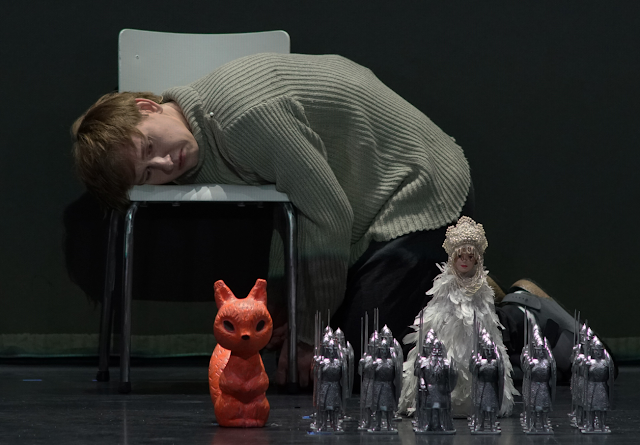Rimsky-Korsakov - The Tale of Czar Saltan, of his Son the Renowned and Mighty Bogatyr Prince Gvidon Saltanovich, and of the Beautiful Princess-Swan
La Monnaie, Brussels, Sunday December 17 2023
Conductor: Timur Zangiev. Production & Sets: Dmitri Tcherniakov. Costumes: Elena Zaytseva. Video Art Direction & Lighting: Gleb Filshtinsky.
Czar Saltan: Ante Jerkunica. Czaritza Militrisa: Svetlana Aksenova. Tkachikha: Stine Marie Fischer. Povarikha: Bernarda Bobro. Babarikha: Carole Wilson. Czarevitch Gvidon: Bogdan Volkov. Czarevna Swan-Bird/Lyebyd: Olga Kulchynska.
Skomorokh/Shipman: Alexander Vassiliev. Messenger/Shipman: Nicky Spence. Old man/Shipman: Alexander Kravets.
La Monnaie Orchestra, Chorus and Children's Choir.
 |
| Photos: Forster/La Monnaie |
This run of Czar Saltan is a reprise of Dmitri Tcherniakov's 2019 production in the same house. It was actually included that year in my old-fogey-special Sunday matinee subscription, but I missed it because I was away for work. So I'd only seen it on video so far, and was very glad to have a chance to see it live, both because I think Rimsky is scandalously underperformed (only yesterday, a clever friend wrote to me: 'His music communicates so clearly. Everything just makes perfect sense') and because the production is great. It was, for example, designated Best New Production in the 2020/2021 International Opera Awards.
For those who haven't seen it, whether live or on video, it pulls off the feat of introducing a serious, contemporary concept to the work without pushing aside Pushkin's tale.
For Tcherniakov, the prince is an autistic youth locked into the fantasy world of his story books. Tin soldiers, a magic squirrel and a swan-princess doll are his toys. His mother therefore attempts to break his family history to him in fairy-tale format. So, while mother and son are in ordinary everyday clothes, we do get the storybook characters, tottering around, doll-like, in their stiff, traditional costumes, all pastel colours and hatched, Hockney-style, with crayons. Sometimes animated drawings (developed, I think, from sketches by Tcherniakov) are projected behind, and sometimes the stage opens up to show the swan princess, set in a 'hand-drawn' background, gradually coloured in, the magnificent city of Ledenetz, or the scenes at court, steeply raked.
But at the end, after the boy is confronted with the reality of his father and a crowd of friends and family, even if they maintain the fairy-tale fiction, the attempt fails miserably: after hammering wildly on the door, as if to escape, the boy collapses, and his mother turns to face us in a silent scream.
It was certainly a joy to hear the score again live; and, as someone asked me what I wanted for Christmas, I should be getting a set of CDs in the next few days - this is one Rimsky opera I didn't yet have. But I'm sorry to say the production, at least on Sunday afternoon, seemed to have been hit by what you might call the 'reprise syndrome'. It was as if it lacked the 100% commitment, the magic spark, the box-freshness it had the first time round. Even Bogdan Volkov's acting (the production makes huge demands) seemed a notch less devastatingly physical, though the end of the story, as seen by Tcherniakov, remains almost unbearably harrowing. I don't know if he came back to direct in person this time, but based on Sunday's performance would guess not.
Musically, too. I don't doubt for a moment that Timur Zangiev knows his business in Rimsky-Korsakov, but the orchestra wasn't quite up to the sumptuous standard they are now capable of achieving with Alain Altinoglu, who conducted in 2019. This was a more quotidian performance.
Bogdan Volkov's was still possibly the best voice in the cast, and Olga Kulchynska, though a touch hard-edged, à la russe, ('a Turandot!' whispered my neighbour), wasn't far behind.
As the Czaritza, Svetlana Aksenova, who undeniably has a big, rich voice, seemed slightly off-form on Sunday, starting off hesitantly and with the odd dodgy moment later. The matinee kicked off a few minutes late, with the conductor waiting for the top départ on his podium, and I wondered if there'd been some hesitation as to whether or not to announce she was sick but would soldier on, but that's only pure speculation on my part. Ante Jerkunica sang variably: sometimes blustery, sometimes very sound. Tkachikha, Povarikha and Babarikha, it seemed to me, sang and acted with slightly less enthusiasm and abandon than before.
Whatever. Perhaps it was just me, perhaps not: fellow subscribers who'd been there last time round confirmed it wasn't quite the same, but wondered if that was just because 2019's novelty-value wasn't there. I'd hoped to end the opera year with a bang, and I was glad to have the chance to catch up with a production that had impressed me so starkly on video, but... well, better luck next time.







Comments
Post a Comment